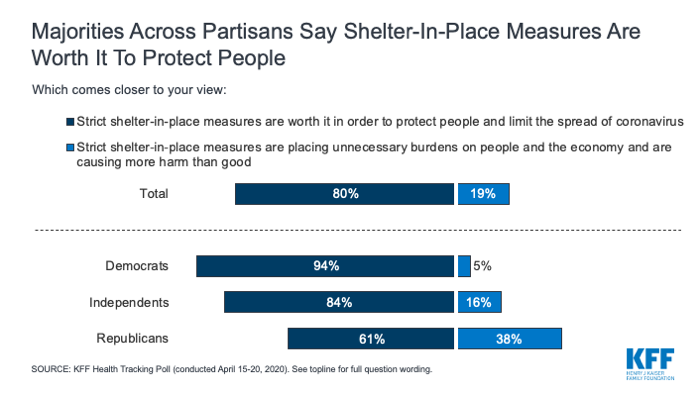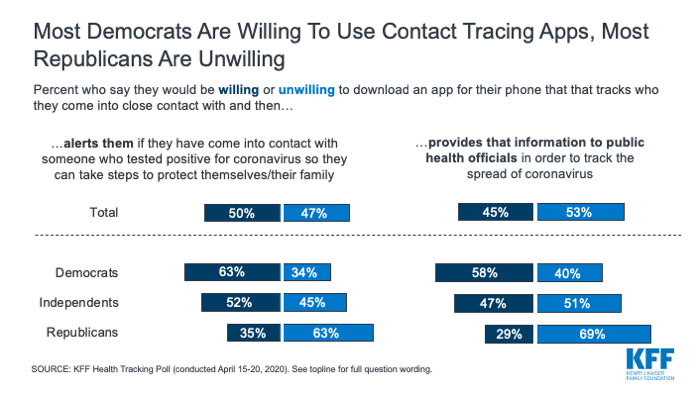
Most Say They Could Continue to Obey Such Orders for Another Month or Longer
From the Kaiser Family Foundation
With President Trump and some Republican governors pushing to restart the nation’s economy, most of the public (80%) supports strict shelter-in-place policies to limit the coronavirus’ spread compared to just one in five (19%) who say these measures pose unnecessary burdens and cause more harm than good, the latest KFF Health Tracking Poll finds.
Majorities of Republicans (61%), independents (84%) and Democrats (94%) support the shelter-in-place orders, though four in ten Republicans (38%) say such orders do more harm than good. Even in states with Republican governors, more Republicans say the strict measures are worth it (63%) than say they do more harm than good (36%).
Republicans are now more optimistic than Democrats and independents that the crisis is getting better. A slight majority of Republicans (53%) now believe “the worst is behind us,” while most Democrats (64%) and independents (56%) believe the “worst is yet to come.”
About half the public overall (51%) now says the worst is yet to come, down from 74% three weeks earlier. Republicans’ growing optimism is a major reason for this shift.
Most adults say they have not left their home at all during the past week to either visit close friends or family (70%), go to work (67%), or exercise (57%). About one in five (20%) say they haven’t left their home even to shop for food, medicine, or other essential household items. One-third (34%) of all adults say they have been deemed an “essential worker,” meaning they are still required to work outside their home.
Three in four Americans (76%) say they bought or made a protective mask to wear in public, consistent with many social distancing guidelines issued by states. Those living in counties where more than 25 people have died from COVID-19 are more likely than those living in counties with 5 or fewer deaths to report using a mask (82% vs. 69%).
Eight in 10 say they could continue to shelter-in-place for at least another month, including a third (34%) who say they could do so for at least six months. Fewer Republicans say they can do this for at least a month (68%) or at least six months (25%), while more say they can do it for less than a month (26%) or not at all (4%).
Public Split on Willingness to Use Smart Phone Apps to Trace Potential Contacts with Infected People
Public health officials say that tracing and monitoring the contacts of infected people is a key element of any plan to contain the COVID-19 pandemic once people return to work, school and everyday life, and some have discussed using people’s smart phones to aid that effort.
The poll finds the public is divided on whether they would download an app on their phone to notify them when they come into close contact with an infected person (50% would, 47% wouldn’t) or to share their close contacts with public health authorities to aid tracking efforts (45% would, 53% wouldn’t).


There are strong partisan differences on these questions. About a third of Republicans (35%) would be willing to download an app to alert them if they come into contact with someone who is infected, and three in ten (29%) would be willing download an app to help public health officials track the spread of the outbreak. Much larger shares of most Democrats say they are willing to download an app for both of those purposes (63% and 58% respectively).
Younger adults generally are more willing to use apps for contract tracing than are older adults. For example, more than half (53%) of 18-29 year olds and just 36% of those ages 65 and over are willing to download an app to share contact information with public health officials.
“The mixed receptivity to using voluntary apps for contact tracing means that they can be an important tool to combat the pandemic but will not be a substitute for old-fashioned contact tracing”, KFF President and CEO Drew Altman said.
The poll finds that arguments that connect the use of such contact-tracing apps to people’s ability to return to work and allow businesses to reopen can increase people’s willingness to use them. Two-thirds (66%) say they would be willing to use them after hearing such arguments. In contrast, an argument about the risk of such information being hacked lowers the share willing to use such apps to 28%.
People are about twice as likely to say they would be willing to download an app for these purposes if it is managed by their state health department (63%), the federal Centers for Disease Control and Prevention (62%), or their local health department (62%) than if it was managed by a private tech company (31%).
While majorities of Democrats and independents and about half of Republicans are willing to download a contract tracing app if the data was managed by the CDC or their state or local health department, fewer than four in ten Democrats (37%), one-third of independents, and one-fourth of Republicans (26%) say they are willing to download such an app if the data was managed by a private tech company.
Other findings include:
- About four in 10 Americans (39%) say they personally know someone who has “tested positive for coronavirus” (24%) or who thinks they had or have coronavirus, but couldn’t get tested (29%). About one in 10 (9%) say they personally know someone who died as a result.
- Seven in 10 adults (72%) say they would be likely to use a coronavirus testing kit that they could use at their home and then send to a lab to find out if they have the virus. This includes majorities across age groups and partisan identification.
- Most Americans give themselves and the people in their household either an “A” (53% and 52%, respectively) or “B” (37% and 31%, respectively) for following local social distancing guidelines over the past two weeks. A smaller majority give their neighbors an “A” (35%) or “B” (35%).
Designed and analyzed by public opinion researchers at KFF, the poll was conducted April 15-20, 2020 among a nationally representative random digit dial telephone sample of 1,202 adults. Interviews were conducted in English and Spanish by landline (261) and cell phone (941). The margin of sampling error is plus or minus 3 percentage points for the full sample. For results based on subgroups, the margin of sampling error may be higher.
KFF will release additional findings from this poll related to the crisis’ impact on Americans’ mental health and finances in the coming days.


